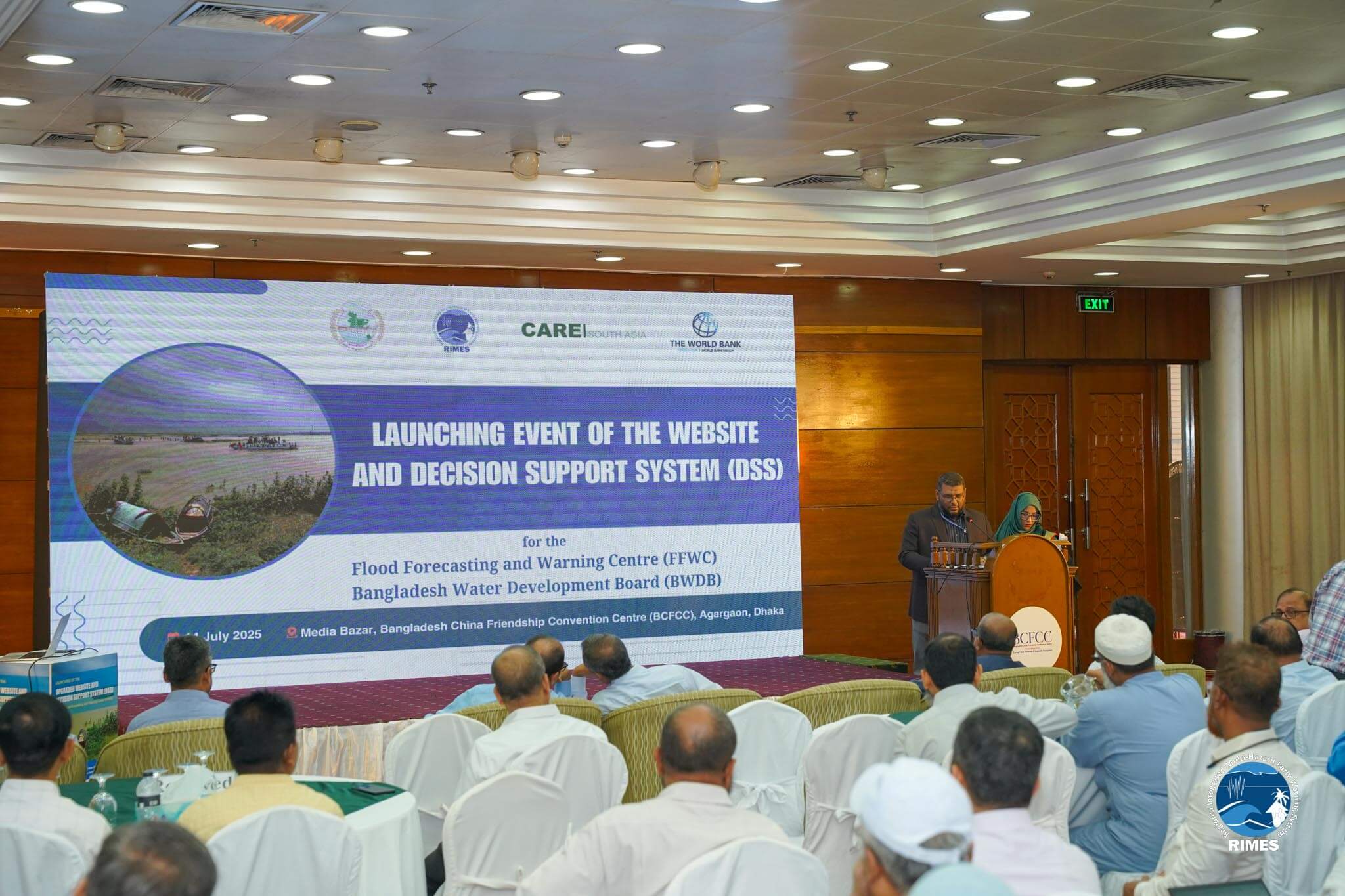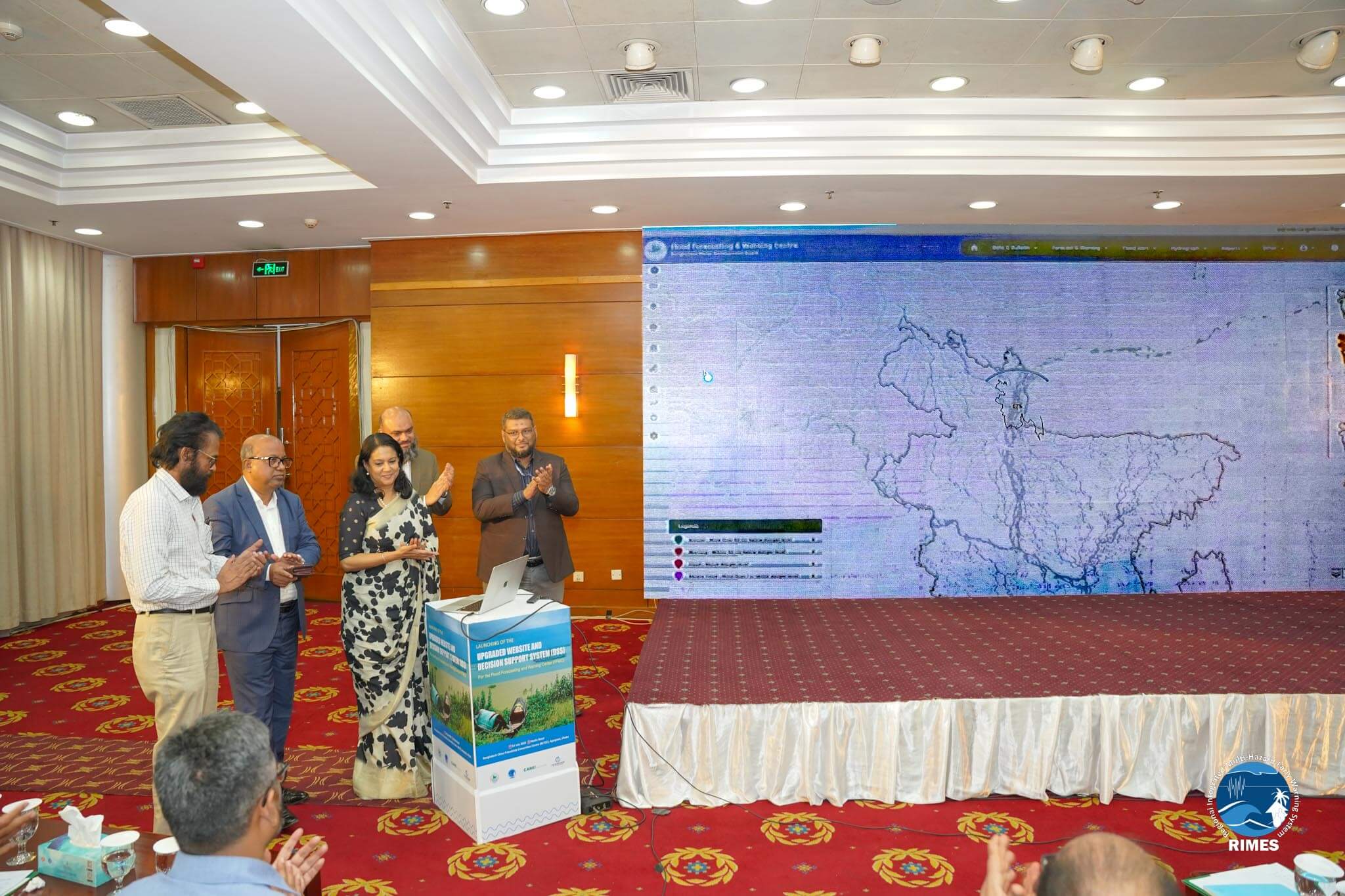Bangladesh Unveils Advanced Flood Forecasting System, Bolstering National Disaster Resilience

BCFCC, DHAKA, BANGLADESH | July 14, 2025 – Bangladesh significantly bolstered its national disaster preparedness capabilities today with the official inauguration of the upgraded website and Decision Support System (DSS) for the Flood Forecasting and Warning Centre (FFWC). The event, held at the Bangladesh-China Friendship Conference Center (BCFCC), Dhaka, marked a pivotal moment in the nation's ongoing efforts to enhance early warning systems and proactively mitigate the devastating impacts of floods.
The upgraded website and DSS are the result of a strong collaboration between FFWC and the Regional Integrated Multi-Hazard Early Warning System for Africa and Asia (RIMES) through World Bank-funded Climate Adaptation and Resilience (CARE) for South Asia Project. Operating under the Bangladesh Water Development Board (BWDB), FFWC plays a crucial role in issuing flood forecasts and warnings nationwide.
The event brought together key government officials, development partners, and humanitarian stakeholders. In his welcome remarks, Md. Zohirul Islam, Additional Director General (Planning, Design and Research) of BWDB, underscored the significance of this upgrade in improving flood preparedness and response.

The FFWC DSS was officially launched by Syeda Rizwana Hasan, Honorable Advisor, Nazmul Ahsan, Secretary of the Ministry of Water Resources, and Tahmidul Islam, Director General of BWDB. Representatives from RIMES, including Raihanul Haque Khan, Country Program Lead for Bangladesh, Nazmul Ahasan, Country Technical Lead, and Faqrul Arefin, Senior Program Manager & Country Coordinator, were also in attendance.
The new DSS, according to Nazmul Ahasan, Country Technical Lead, prioritizes usability, easy-to-understand warning information, user-specific analytics, and real-time alerts. It incorporates rainfall pattern analysis and boasts system automation to save time. The DSS also leverages data-driven predictions, enabling flash flood warnings even in areas with limited historical data.
Raihanul Haque Khan, RIMES' Country Program Lead for Bangladesh shared valuable insights on the DSS development and outlined a way forward for flood forecasting in the region. He highlighted the intention to incorporate exposure indicators into the current hazard-based system, moving towards impact-based forecasting to identify the most affected areas during a flood. To ensure community benefit, Mr. Khan emphasized the importance of delivering tailor-made information to end-users, such as voice message broadcasting. He also noted the significant monetary savings achieved in 2024 due to damages avoided through timely flood early warnings.
Secretary Nazmul Ahsan reiterated the Ministry's steadfast commitment to ensuring the safety and well-being of its citizens. He lauded the enduring partnership with RIMES, which has been instrumental in augmenting Bangladesh's flood forecasting capabilities since 2012. This collaboration has led to the development of advanced 5-day deterministic, 10-day probabilistic, and 15-day long-range experimental flood forecasts for the Ganges-Brahmaputra-Meghna basin. Secretary Ahsan also highlighted the successful expansion of warning dissemination to grassroots communities, with over 20,000 mobile numbers now receiving actionable voice messages, significantly enhancing local preparedness.
Syeda Rizwana Hasan, Honorable Adviser to the Ministry of Water Resources and the Ministry of Environment, Forest and Climate Change, offered a comprehensive perspective, emphasizing the FFWC DSS as more than just a water level prediction tool. She highlighted it as a foundational pillar for building a holistic system of resilience, empowering communities with critical time for preparedness and decision-making. The Honorable Adviser also stressed the DSS's crucial role in informing long-term strategic planning and broader climate adaptation strategies. She advocated for a "smart" approach to climate challenges, questioning the sustainability of solely infrastructure-based support and instead proposing more efficient emergency fund spending and a rethinking of emergency interventions. Ms. Hasan suggested the potential for site-specific, real-time data from the UK, accessible by local administration, requiring training for effective utilization. She also advocated for enhancing the general public's understanding of climate knowledge, investing in advanced radar technology, and improving the effectiveness of climate-related interventions.
Furthermore, the Honorable Adviser urged a focus on river erosion, emphasizing the need for smart, proactive solutions. She proposed collaboration between the River Research Institute, RIMES, and FFWC, highlighting the value of RIMES' current work and suggesting further scope of investment in this area. She also suggested including other research, such as zonal inundation maps, to smartly expand and improve the initiative.
A.K.M. Tahmidul Islam, Director General of BWDB, elaborated on the tangible operational impact of the upgraded system. He detailed how the advanced features, including real-time data from 116 water level monitoring stations and detailed inundation maps, would empower BWDB's engineers and field teams, directly translating into enhanced operational efficiency and effectiveness. He expressed profound gratitude for the exceptional partnership with RIMES and the pivotal support from the World Bank-backed CARE for South Asia Project.
The event concluded with a vote of thanks delivered by Dr. Shamal Chandra Das, Chief Engineer, Hydrology, BWDB, who recognized the collective efforts of all partners and participants in making the successful launch possible.
Ultimately, the upgraded FFWC website and DSS are set to revolutionize flood warning and preparedness in Bangladesh by delivering more precise, longer-range, and impact-based forecasts. This enhanced capacity facilitates superior planning, meticulous water management, and seamless data integration with critical government departments such as Disaster Management (DDM), Agricultural Extension (DAE), and Livestock Services (DLS), Department of Fisheries and many other relevant stakeholders.
By prioritizing anticipatory action and last-mile connectivity through diverse channels, including voice messages and digital display boards, the system aims to empower communities to undertake preventative measures before a disaster strikes, thereby substantially reducing human suffering and economic losses. The inauguration thus marked a new and promising chapter in Bangladesh's national flood preparedness journey, symbolizing a profound collective commitment to innovation, collaboration, and the cultivation of a more resilient and disaster-resilient future for all its citizens. (30)